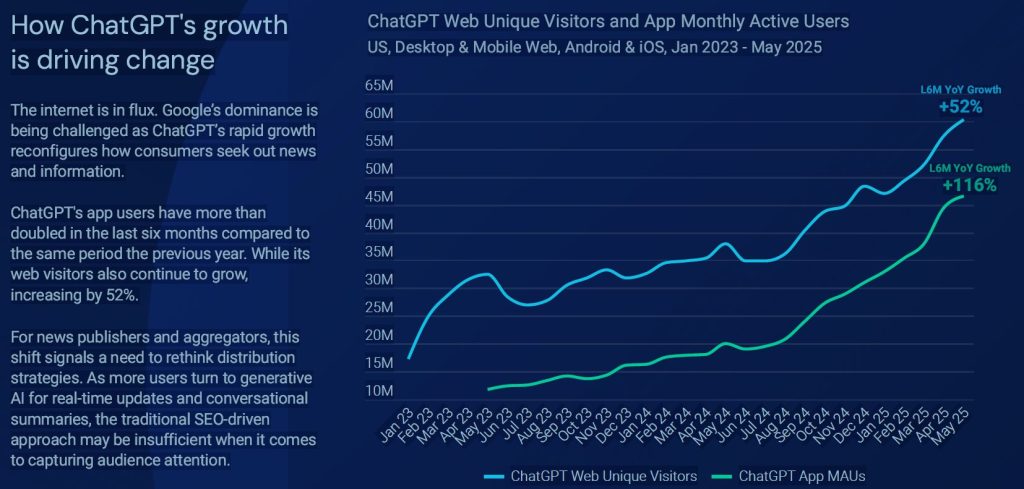Google’s AI Overviews promise faster, smarter answers by placing AI-generated summaries at the top of search results. For users, that means instant clarity without extra clicks. But for anyone who depends on people finding them through organic and paid search results, it’s a big problem – hitting news outlets, retailers, travel companies, universities, and B2B brands alike.

AI Overview appears at the very top of the search results — the first thing users see before any organic listings
Clicks Are Falling
A March 2025 Pew Research Center study, reported by Mashable, found that when an AI Overview appears, users click a traditional search result only 8% of the time, compared to 15% without one. Links inside the summary see even less engagement, just 1%, and more than a quarter of those searches end without visiting any site.
Research from Ahrefs and Amsive, reported by Search Engine Land, shows click-through rates for top organic results drop 15–35% in these cases, with non-branded queries hit hardest. Pages outside the top three positions fare worse, losing over 27% of clicks.
Publishers Face a Double Challenge
For publishers, the numbers are sobering. The Guardian cites data showing some news sites lose up to 79% of traffic when their content appears beneath an AI Overview. SimilarWeb data, highlighted by the New York Post, shows 37 of the top 50 news domains have seen declines since the rollout: Forbes and HuffPost are down around 40%, DailyMail.com 32%, CNN 28%, and The Wall Street Journal 17%. Overall news traffic dropped from 2.3 billion visits in mid-2024 to 1.7 billion by May 2025, as zero-click searches surged from 56% to 69%.
At the same time, SimilarWeb also reports that news-related prompts in ChatGPT rose 212% between January 2024 and May 2025, while equivalent Google searches fell 5%. ChatGPT’s mobile app users have more than doubled year-on-year, and web visitors are up 52%, signalling a broader shift toward AI assistants for real-time news and analysis.

Similarweb Report
Beyond the Newsroom
This isn’t confined to journalism. For e-commerce brands, AI Overviews often condense buying guides, reviews, and price comparisons into a neat summary – meaning fewer shoppers click through to read the full details on a retailer’s site. Travel companies face similar challenges: destination guides, itineraries, and hotel recommendations that once drew steady traffic can now be distilled into Google’s AI snapshot, reducing the incentive for users to browse the original content.
Universities and education providers risk losing prospective students who search for course or admissions information and get a consolidated answer without visiting the institution’s website. For B2B companies, especially in niche industries, the effect can be even more acute – high-value informational content that was designed to capture early-stage leads may never get seen if Google’s AI Overview satisfies the query at a glance.
In every sector, the pattern is the same: if Google’s AI can answer the question directly, fewer people feel the need to click through, undermining the traditional SEO-driven discovery model.
Accuracy and Behaviour Shifts
While Google says AI Overviews draw from credible sources, The Times has documented cases of “hallucinations” – summaries that present inaccurate or misleading information. In some instances, product details have been misrepresented, historical facts misquoted, or policy advice oversimplified. For businesses and universities, this creates a reputational risk: the first thing a potential customer or student learns about you might be wrong, and correcting that perception is far harder than preventing it.
User habits are also shifting in ways that compound the problem. Studies cited by Search Engine Land show that most people skim only the top of the AI Overview and stop. On mobile, fewer than one in five users click any citation; on desktop, that drops to just 7%. Some users don’t click at all – instead, they head straight to platforms like Reddit or specialist forums for deeper discussion, bypassing the original source entirely.
This behavioural change doesn’t just affect traffic numbers; it alters the whole relationship between audience and brand. Without direct visits, organisations lose the chance to shape the user’s experience, encourage engagement, or build long-term loyalty.
As Kim Mclellan MD at Hunterlodge reiterates “In this new era of search, the real competition isn’t just other brands – it’s the answer box itself.”
Google’s Direction
Google insists AI Overviews improve the search experience, claiming they now reach over 2 billion monthly users. It is rolling out AI Mode, described by Wired as a conversational, chat-style search powered by Gemini 2.5, and is integrating ads directly into AI Overviews, according to Business Insider. Both moves are likely to keep users within Google’s platform for longer.
The New Search Reality
From falling click-through rates to increasing ChatGPT adoption, the evidence points to a fundamental change: Google is no longer just a gateway to the web – it’s becoming a destination in its own right. For organisations across sectors, success will mean adapting strategies for a world where even a number-one search ranking is no longer a guarantee of traffic.
If you need help or advice on your search strategies mailto: kim.mclellan@hunterlodge.co.uk
Get in touch today: kim.mclellan@hunterlodge.co.uk
